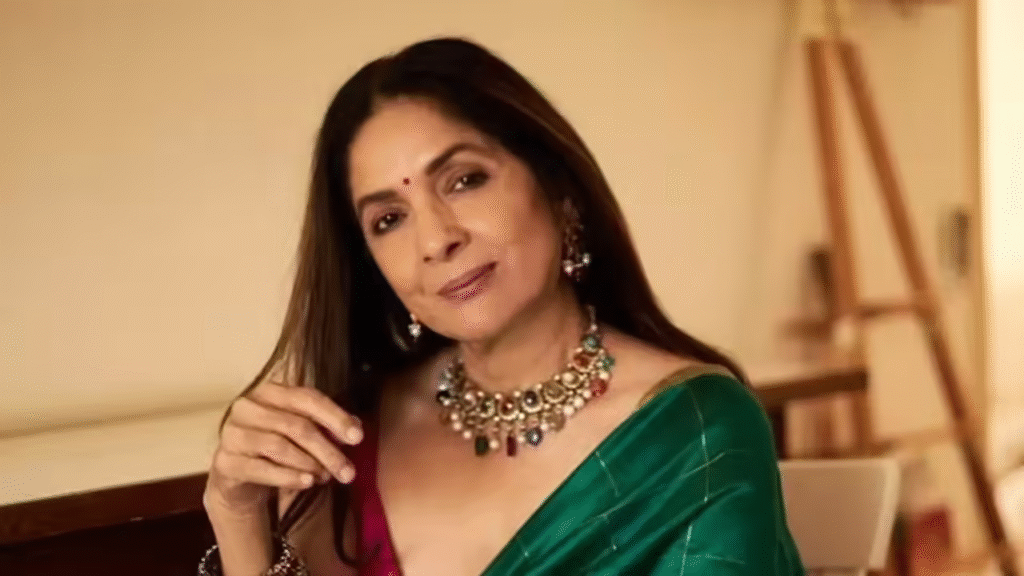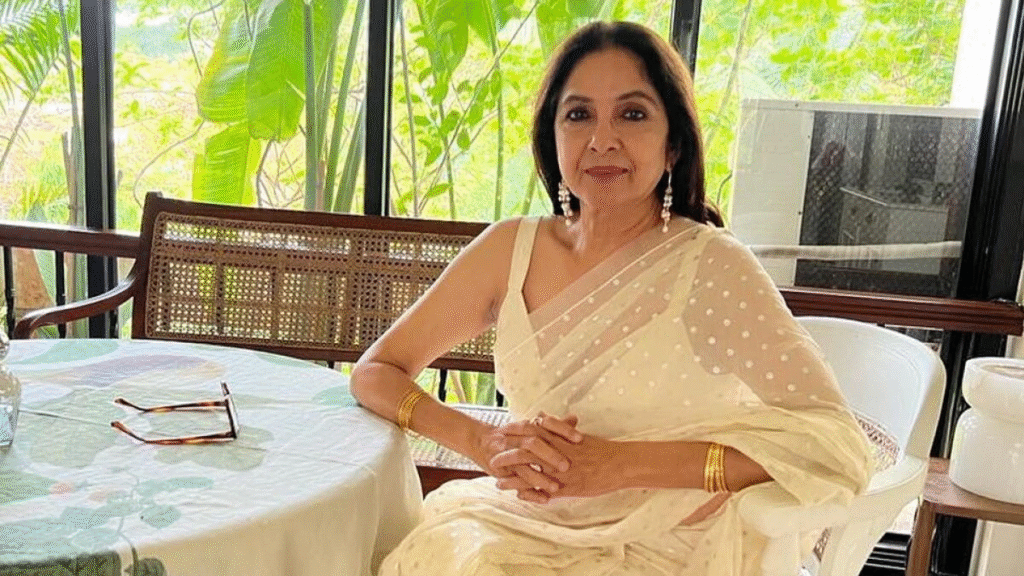Neena Gupta Reveals 7 Key Insights on Real-Life Love vs Movie Romance in Metro…In Dino
Neena Gupta reveals 7 key insights on how real-life love differs from movie romance while promoting Metro…In Dino. In a candid moment, she says she’s never experienced the kind of love shown in films or books.
Introduction to Neena Gupta’s Candid Reflections on Love and Romance
Veteran actress Neena Gupta, celebrated for her nuanced performances and bold life choices, has once again captured public imagination—not through a film role, but via her honest reflections on love, relationships, and societal expectations. While promoting her latest film, Metro… In Dino, directed by Anurag Basu, Neena sat down for an interview with News18 Showsha, during which she offered a deeply personal and introspective look at her journey with love. The revelations have since stirred thoughtful conversations around how romance is portrayed in Indian cinema versus how it plays out in real life.
In a world conditioned by Bollywood tropes of eternal devotion and epic love stories, Neena Gupta’s grounded commentary struck a chord with many. Known for her fearless candor, the actress admitted that despite a life filled with vibrant experiences, she has never been loved the way movies or novels often depict love. Her observations challenge the mainstream narrative that idolizes an almost mythical version of romantic love.
The First Glimpse of Love – A Young Woman and Her IITian Partner
During the interview, Neena recalled her first relationship with a man who studied at the prestigious Indian Institute of Technology (IIT). Eventually, this young man became her husband. Neena reflected on that time with a mix of nostalgia and realism. As a college student, she was seen as modern and liberated, which, according to her, drew both admiration and envy.
“My first love was with an IIT guy, who I went on to marry eventually. My college fellows used to be very jealous of me at that time. Their parents wouldn’t allow them to wear spaghetti straps and I was a modern woman, according to them. Woh salwar kameez–chunni waale the aur woh mujhse jalte the,” she said.
Her anecdote paints a picture of a young woman ahead of her time, navigating societal scrutiny and conservative norms. Despite her independent streak, even a simple movie date with her boyfriend was thwarted by her peers, who informed her parents. This incident left a deep impression, especially because she couldn’t inform him in the era before mobile phones. The boy waited in vain—an early lesson in the fragility of young love constrained by tradition.
The Void of Cinematic Love in Real Life
What perhaps resonated most was Neena’s confession that she had never experienced love in the way films and books describe. “I’ve never been in love. The love that I see in movies and read about in books, I’ve never experienced that in real life. Nobody has loved me like that,” she revealed.
Her statement cuts through the romanticized ideal of being someone’s everything—the obsession, the poetry, the passion. She emphasized that no one had ever been “mad” for her. “Mere peeche koi paagal nahi hua,” she added with a smile. But this void didn’t stem from lack of effort; she confessed to having fallen madly in love with someone, a love that never materialized into a relationship because it “wasn’t possible.”
This nuanced understanding of love—not as a guaranteed reciprocation but as an often one-sided emotional investment—adds depth to the discourse. It’s a perspective that many, especially women, may find painfully relatable.
Love, Marriage, and Unconventional Choices
Neena Gupta’s personal life has often been the subject of public discussion, not least because of her relationship with former West Indies cricket legend Vivian Richards. The two never married, but together they have a daughter—Masaba Gupta—who has carved her own identity as a successful fashion designer and reality television star.
Neena’s decision to raise Masaba as a single mother in the 1980s—a time when such choices were far less socially acceptable—earned her both criticism and admiration. Years later, she married Vivek Mehra, a Delhi-based chartered accountant, with whom she has now shared nearly 13 years of companionship.
Despite finding stability later in life, her reflections suggest that the kind of all-consuming romantic love depicted in films remained elusive. Yet, there’s no bitterness—only a mature acknowledgment that love comes in many forms, and not all of them mirror Bollywood’s grandiose visions.
Cinema vs Reality – Deconstructing the Myth of Perfect Love
Neena Gupta’s comments invite a broader critique of how love is constructed in Indian popular culture. Bollywood has, for decades, sold the idea that true love is immediate, all-consuming, and eternal. From Dilwale Dulhania Le Jayenge to Kabir Singh, the recurring themes are persistence, passion, and perfection. But does real life ever align with these portrayals?
Gupta’s life—filled with highs and lows, public scrutiny, and bold choices—suggests otherwise. Her acknowledgment that no one was ever “madly in love” with her is not a lament, but a realist’s view of how relationships are often transactional, situational, and shaped by circumstances far beyond mere emotion.
This divergence is especially important in today’s world where young people, influenced by on-screen depictions, often develop unrealistic expectations. The result is disillusionment when real-life partners fail to live up to the archetypes of the obsessive lover or self-sacrificing soulmate.
A Career of Defiance and Authenticity
Neena Gupta’s career mirrors her personal philosophy—unconventional, bold, and rooted in authenticity. From Sanskrit plays and parallel cinema to popular TV shows like Saans and recent hits like Badhaai Ho, she has never shied away from portraying complex characters. Much like her off-screen persona, her roles often challenge stereotypes and delve into the lived experiences of women across age groups.
In Metro… In Dino, she plays opposite veteran actor Anupam Kher in a subplot that explores love in later life. This casting itself is an affirmation that stories of romance do not—and should not—be limited to the young and traditionally attractive. By embodying a woman in love past middle age, Neena once again pushes against the grain of standard Bollywood storytelling.
The Cultural Mirror – Cinema vs. Reality
Cinema, especially Bollywood, has long served as both an escape and an aspiration for its audience. The archetype of mad love, where a lover chases after the beloved through rainstorms, rebellious families, and near-death experiences, forms the bedrock of most romantic dramas. Neena Gupta’s comments serve as a poignant mirror to this cultural construct, shedding light on the disparity between the cinematic portrayal of love and its nuanced, often subdued real-world counterpart.
Gupta’s experience is not singular. For generations, both men and women have internalized cinematic love as a benchmark, only to be disillusioned by its absence in real life. This gap between fiction and reality has deep emotional consequences—fueling dissatisfaction, unrealistic expectations, and at times, heartbreak.
Feminine Agency and Societal Constraints
Neena’s memory of how her movie date was sabotaged by her own friends points to a larger theme: the persistent regulation of women’s freedom, especially in the context of romance. Her reflection highlights a time when societal policing of female behavior, clothing, and choices was overt and, sadly, normalized.
Even though Gupta was perceived as a ‘modern woman,’ it came at the cost of being misunderstood, envied, or morally judged. Her anecdote of friends alerting her parents about a simple movie plan underscores how patriarchy operated not only through institutions but also through peer networks and internalized policing.
The Enigma of Love – Lived vs. Idealized
Gupta’s declaration, “I’ve never been in love,” is not just a personal revelation—it is a profound social commentary. In a world where the existence of love is often assumed to be universal, such a candid admission disrupts the narrative. It opens a window into understanding that for many, love as constructed by society may never manifest, or may manifest differently than expected.
This does not necessarily equate to a lack of romantic experiences, but rather the absence of an all-consuming, passionate force often glamorized in books and movies. Her honesty offers a form of liberation to countless individuals who have felt inadequate for not experiencing “storybook” love.

A Reframing of Relationship Goals
Neena Gupta’s reflections allow space to reframe what counts as a fulfilling romantic journey. The absence of romantic grandiosity in her life does not diminish her identity, nor does it negate the depth of her relationships. It’s a crucial reminder that love need not fit a mold—it can be practical, quiet, and even unrequited.
Her marriage to Vivek Mehra, a chartered accountant, has lasted for over a decade. This enduring partnership, devoid of cinematic fanfare, hints at mutual respect and companionship—qualities often sidelined in mainstream love narratives. In celebrating this quieter, more grounded form of love, Gupta challenges prevailing assumptions and redefines what it means to be loved.
Intergenerational Love – A Shifting Paradigm
In Neena Gupta’s reflections, there’s also a contrast between love across generations. Her early experiences of love as a college student, her evolving roles as mother and wife, and her current public visibility as a veteran actor illustrate how the meaning of love shifts with age.
For today’s younger generation immersed in dating apps and digital courtships, Gupta’s narrative may seem like a relic. But it also offers perspective: love, like any emotion, is shaped by cultural, technological, and temporal contexts. Her story serves as a living archive of how romance was once experienced, regulated, and remembered.
Love and Public Identity
In being candid about her personal life, Neena Gupta reinforces her image as one of Bollywood’s most authentic voices. This transparency not only humanizes her but also breaks the myth of celebrity infallibility. For fans who often conflate on-screen personas with real-life perfection, Gupta’s admission is grounding.
Moreover, in a cultural industry obsessed with glossy profiles and curated romances, her straightforward take is refreshing. It allows for a broader definition of celebrity—one where vulnerability is not a weakness but a source of strength.
Gendered Expectations in Romance
Gupta’s remarks also subtly expose the double standards that define romantic desirability in South Asian cultures. While men are often allowed multiple romantic experiences without judgment, women are either idealized or vilified. Her comment—”Mere peeche koi paagal nahi hua”—echoes this gendered imbalance.
The notion of being ‘chased’ or ‘madly loved’ is often reserved for ideal heroines in male-centric narratives. Gupta’s lived reality disrupts this, showing that desirability, affection, and romantic fulfillment are not always reciprocated or celebrated, especially for women who defy traditional norms.
The Enduring Impact of Missed Moments
Her story of the missed movie date—a small yet poignant incident—symbolizes the many unspoken disappointments that accompany youth. These small moments, while seemingly trivial, form the foundation of emotional memory and shape one’s understanding of intimacy and betrayal.
For Gupta, the inability to explain her absence due to the lack of mobile technology reflects a bygone era of misunderstandings and missed connections. It brings to light how technological shifts have transformed how people communicate affection, manage crises, and process rejection.
The Unlived Love Story
There’s a profound emotional weight in Gupta’s acknowledgment that she once loved someone madly, but the relationship did not materialize. This story, untold in detail, leaves space for imagination and empathy. It adds a layer of emotional complexity to her public image and connects her with countless individuals whose deepest affections never found closure.
The lack of reciprocation or societal feasibility in that love is perhaps what lends her reflection its enduring sadness. It invites audiences to consider that even incomplete love stories hold value.
Parenthood and Parallel Fulfillments
Though Gupta laments the absence of passionate romantic love, her identity is richly layered by her roles as mother and professional. Her daughter Masaba, now a celebrated fashion designer, represents a different kind of legacy—one of resilience, creativity, and maternal love.
In many ways, Gupta’s life reflects how fulfillment can arrive in multiple forms. The richness of parenthood, the satisfaction of professional success, and the dignity of self-reliance offer counterpoints to romantic deprivation. These facets remind audiences that a life need not be defined by the presence or absence of a romantic partner.
An Archetype of Strength and Vulnerability
Over the years, Neena Gupta has emerged as a public figure who seamlessly blends strength with vulnerability. From raising a daughter as a single mother in a conservative society to making a late-career resurgence, she embodies what it means to be resilient.
Her statements about love are just another facet of her candor—one that reveals how even the strongest personalities harbor quiet sorrows. This blend of bravery and emotional honesty makes her a relatable figure, particularly for women navigating similar terrains.
Evolving Public Perceptions of Love
Gupta’s commentary invites a broader societal re-evaluation of what constitutes love. Is it the whirlwind romance we see on screen, or the enduring companionship of a long-term partnership? Is it the ecstasy of being pursued or the quiet joy of mutual respect?
These questions gain relevance in a society increasingly grappling with fragmented relationships, commitment issues, and emotional burnout. Gupta’s voice serves as an anchor, reminding audiences to find meaning in forms of love that are often dismissed or overlooked.
Love as Self-Reflection
In many ways, Gupta’s reflection on her romantic life is an invitation for self-inquiry. Her candidness encourages others to think about the narratives they’ve internalized about love. Are they chasing a cinematic illusion, or embracing the love that quietly exists around them?
This process of questioning is both liberating and necessary. It allows people to deconstruct unrealistic ideals and build relationships rooted in empathy, communication, and shared values.

The Empowerment in Owning One’s Story
Neena Gupta’s narrative arc—both professional and personal—demonstrates the power of storytelling in reclaiming agency. By sharing her truth, she asserts ownership over her identity, untethered from societal expectations or fictional templates.
Her reflections on love are not just confessions; they are declarations of autonomy. In telling her story, she frees herself—and by extension, others—from the burden of romantic mythologies that no longer serve contemporary realities.
Reflections on Past and Present
Neena Gupta’s candid reflections are a bridge between generational perceptions of love and the evolving social norms that continue to redefine emotional connection. Her insights touch on themes such as the suppression of female autonomy during her youth, societal scrutiny, and the loneliness that can accompany a woman who defies conventional expectations.
For younger audiences, Gupta’s story may seem like a dramatic narrative from a bygone era. But for others, especially those who navigated relationships before the digital age, her memories resonate with emotional precision. Gupta’s inability to connect with her partner because of the lack of mobile phones at the time also exemplifies the communicational limitations that shaped—and sometimes ruined—relationships in earlier decades.
The Media’s Role in Framing Love
Mainstream media and cinema have long played a powerful role in constructing societal beliefs about love. The Bollywood industry, in particular, has shaped generations of expectations about what romance should look and feel like. Grand gestures, eternal loyalty, unending passion—these tropes are etched into cinematic storytelling, often sidelining the quiet complexities and imperfections of real relationships.
Neena Gupta’s own acknowledgment that she never experienced the kind of love seen in films underscores how cinematic fantasy can distort the real-life pursuit of intimacy. This realization is significant, coming from someone who has both been a part of that industry and observed its cultural impact firsthand.
Societal Judgments and Stereotypes
The anecdote about Gupta’s friends alerting her parents of a planned movie date is not just about a missed opportunity—it’s emblematic of the deeply embedded control over women’s choices in mid-20th century India. Gupta was judged not just by her peers but also by societal frameworks that restricted expressions of love, freedom, and individuality.
Even now, while many aspects of Indian society have modernized, traditional pressures continue to shape relationships. Women often find themselves caught between familial expectations, societal values, and personal desires. Gupta’s narration serves as a mirror to this enduring conflict.
Shifting Feminine Narratives
Gupta’s story is also emblematic of how the narrative of the modern Indian woman is shifting—from passive recipient of love to active agent in her own life story. Her willingness to speak openly about emotional absence, romantic disappointment, and personal longing is a quiet act of rebellion against idealized femininity.
Her honesty strips away the gloss and glamour often associated with celebrity life. By admitting to feelings of abandonment and expressing unmet emotional needs, Gupta expands the definition of success. In doing so, she encourages others to value emotional authenticity over romantic perfection.
Literary and Cinematic Romanticism vs. Reality
The dissonance between the romanticism depicted in movies and books and Gupta’s personal experiences raises critical questions about how love is written, visualized, and commodified. Bollywood, for instance, is known for projecting emotionally intense story arcs, where love conquers all odds.
But Gupta’s reality didn’t follow that script. Her recognition that no one was ever “madly in love” with her challenges the notion that love must be dramatic and all-consuming. It affirms that love can be absent, misunderstood, or fall short of our expectations, and that such experiences are no less worthy of acknowledgment.
Women Redefining Success
Gupta’s journey also reinforces a broader redefinition of what it means to be successful. In a society that often places romantic fulfillment at the apex of personal achievement for women, Gupta’s life demonstrates how self-worth can transcend relationship status.
Her successful acting career, motherhood, and authorship highlight dimensions of identity often ignored in favor of romantic milestones. Gupta doesn’t deny the pain of unrequited love, but she also doesn’t let it define her. This balance between vulnerability and resilience is what makes her story so compelling.
Role of Memory and Selective Recall
Our memories of love, especially those that did not culminate in happy endings, are often marked by ambivalence. Gupta’s reflections are shaped by years of lived experience, which influence how she interprets her past.
That she remembers the missed movie date so vividly suggests it had a lasting emotional impact. But it also reveals how unresolved emotions continue to find voice later in life, particularly when societal taboos surrounding emotional expression begin to loosen with age.
Public vs. Private Persona
As a public figure, Neena Gupta has often straddled the delicate balance between personal privacy and public visibility. The vulnerability she reveals in her interview adds a new layer to her persona—one that contrasts with the composed and commanding presence she typically embodies on screen.
This duality is something many women, public or otherwise, navigate daily. Gupta’s confession becomes a shared moment for anyone who has masked emotional voids with professional success or composure.

Bridging Generations Through Shared Truths
By speaking about her unfulfilled romantic experiences, Gupta also builds a bridge between generations of women. Her words resonate with older audiences who endured similar societal constraints, as well as with younger women questioning cinematic portrayals of love.
The honesty in Gupta’s account reinforces the value of generational dialogue—of learning from the emotional histories of those who came before us. It is through such stories that we gain perspective, empathy, and perhaps the courage to rewrite our own narratives.
The Impact of ‘Metro… In Dino’
The film ‘Metro… In Dino’ provides the cinematic backdrop for Gupta’s real-life reflections. Her role in the film, which explores modern relationships, serves as a mirror to the themes she discusses off-screen. This duality—fictional romance and personal reality—adds depth to both her performance and her public identity.
In a culture where celebrities are often forced to maintain an illusion of perpetual happiness, Gupta’s honesty offers a refreshing alternative. It shifts the spotlight from fantasy to truth, and in doing so, reminds us that the most profound stories are often the ones rooted in vulnerability.
Also Read : Sudhanshu Pandey-Apoorva Mukhija Exchange: 6 Facts Breaking the Internet








